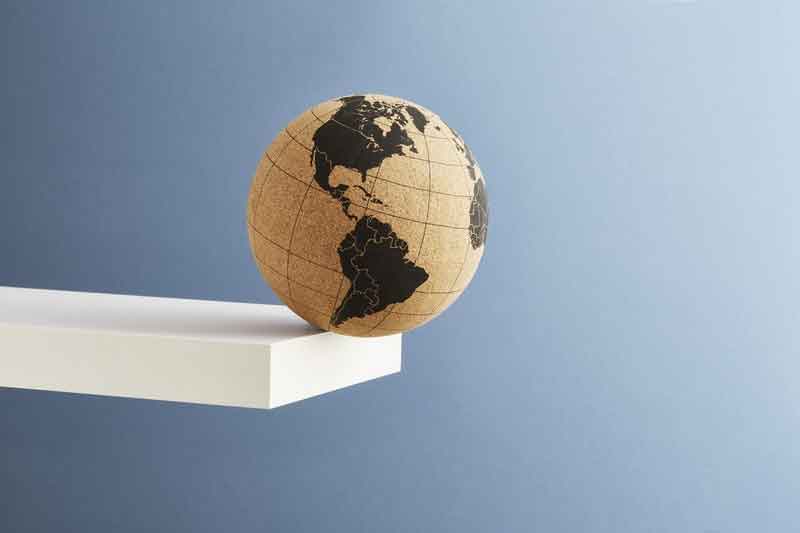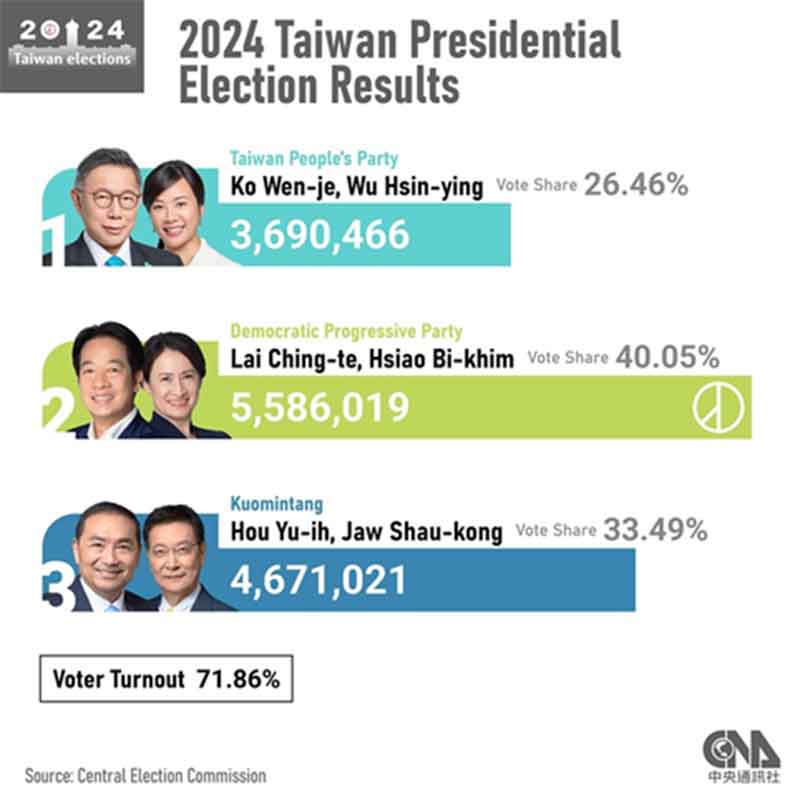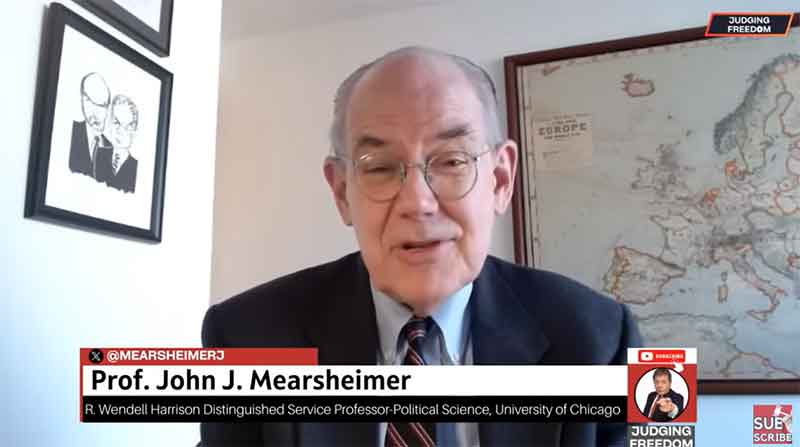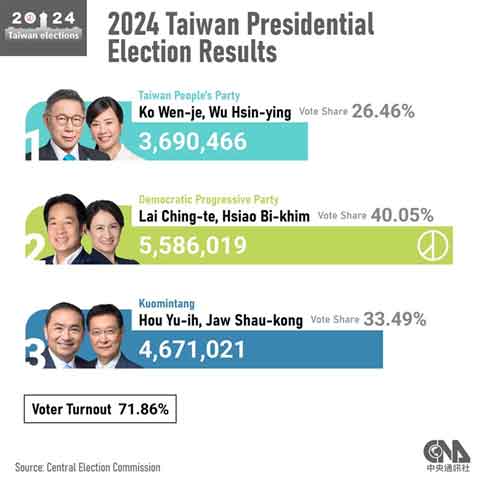
The big media, fed by the West, manufactures news about Taiwan. It always reports thus: “ Taiwan which China claims as part of its territory,” a cliche. It hides the fact – a fact which most of the younger generation, even educated and politically savvy, do not know – that out of 193 members of UN, only about 12, tiny in size and population, recognize Taiwan; few of their names are known to common people. The UN, which recognizes even Palestine Authority, itself does not recognize Taiwan. None from the developed countries, neither USA nor any from Europe, recognize it. That is all because of One China Policy ( see Appendix on the policy). Most people know Taiwan as a source of modern gadgets, but do not know these facts. Soon after elections, one member, Nauru, withdrew its recognition of Taiwan. But there is a big media hype around the much-awaited Taiwan elections held on Jan 13. This report seeks to give a brief insight, and analyse the election results, and their import, in an international context.
The ruling DPP, favored by USA, was back in power with the elections (see chart above). The media highlighted that it was the first time any political party won three consecutive four-year terms in office since Taiwan first held direct elections in 1996. It underplayed that the DPP was weakened, polled less votes and lost a crucial absolute majority in the parliament: DPP won 51 seats in total, 10 less than four years ago. The nationalist opposition KMT won 52, and TPP 8, in a House of 113, together commanding majority. While the KMT sees the island as part of China, the DPP is in favor of an independent Taiwan.
The new regime will take office only in May. That gives some time to the US, in its own election year, to fish in troubled waters of the Far east: The very next day of the results, a US delegation arrived in Taiwan.
According to the election authority CEC, 19.55 million people from Taiwan’s population of 23.4 million were eligible to vote this year, including around 1.028 million first-time voters. There were a total of 17,795 polling stations around Taiwan. It held its four-yearly presidential and legislative elections, with around 72 percent voters casting their ballots for a new president, vice president and 113 legislators. (CEC data.)
DPP’s Lai Ching-te received 5,586,019 votes, or 40.05 percent of the total, defeating main opposition Kuomintang (KMT) candidate Hou Yu-ih, who took 33.49 percent of the vote, and Ko Wen-je of the smaller Taiwan People’s Party (TPP), who garnered 26.46 percent, according to the Central Election Commission (CEC). Lai had a much smaller margin of victory than did outgoing President Tsai Ing-wen of the DPP in 2016 and 2020 when she won by 25 percentage points and 18.5 points, respectively.
In many countries, when there is no majority, i.e., 50 percent plus seats and votes, it is not regarded as a victory. There is a run-off election. In First past the post system, as we have it in India, a party or person with minority (less than 50 percent) vote is also deemed as elected. No party in India, including Modi-led BJP, ever got 50 percent plus votes, even out of those polled, not total electorate. Thus with a minority vote, the winner claims a ‘mandate’ which is not there. So it is in Taiwan, DPP got only 40 percent vote. The Ruling party won less and less seats than earlier, fell short of majority, in a hung House, while KMT, favoring peace with China, won more and more. True it is a multi-cornered contest, but it was the same earlier too:
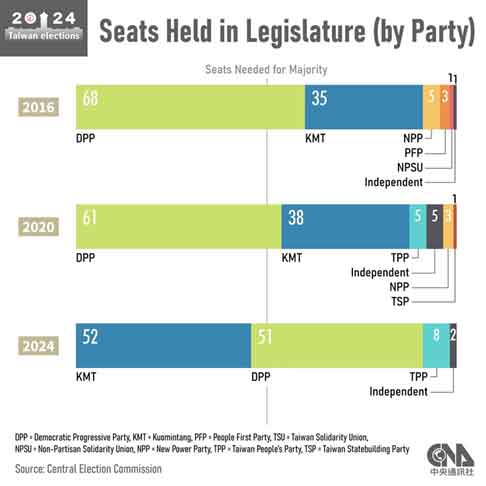
*** ***
The third political party, TPP’s role
“Normally, the opposition would win these upcoming elections hands down,” guessed Wu before elections…but a third party TPP grew in strength, resulting in uncertainty.
In addition to the presidential contest, the TPP also made significant strides in the legislative elections, obtaining 3.04 million party votes, and securing eight legislative seats. The TPP had received 1.58 million party votes in 2020.
Wu Rong-yuan, the chairman of the Labor Party of Taiwan, also a contestant, explained the situation before polls:
“ .. the economic positions of both parties (DPP and KMT) are not significantly different. Both align themselves with the U.S. “Moreover, they also find common ground in anti-communism against the rulers in Beijing,” said Wu, “but while the Kuomintang claims that the residents of Taiwan and the mainland of China form one Chinese nation, separated by the sea and different ideologies, the DPP invented Taiwanese nationalism: Since they came to power 23 years ago, they managed to create a distinct Taiwanese identity out of nothing.”
“ This does not mean that all Taiwanese support the DPP’s course. On the contrary, the popularity of the ruling DPP has significantly declined. Normally, the opposition would win these upcoming elections hands down. The population is divided over the right stance toward China… A sure win for the Kuomintang, then? Not quite, because this time there is a third party (TPP) .. It briefly seemed like this party would form a joint presidential ticket with the Kuomintang, but in November, they ultimately chose to run separately.”
“ With a divided opposition, the DPP could (indeed it did) still win the elections…However, the rise of a third party has an important consequence: Regardless of who wins the presidential elections, they will likely not have a majority in the parliament. This means compromises will have to be made.
“ According to Wu Rong-yuan, these are crucial elections for the relations between Taiwan and China. The Kuomintang advocates the status quo which means that both recognize there is one China but have different interpretations about what this means. The DPP wants to assert Taiwan’s status as an independent country and can count on U.S. support for that.
“The confrontational policy of the U.S. makes the status quo impossible,” says Wu, “while the independence the DPP seeks, isolates us from the mainland and goes against the interests of the workers.”
Wu finally explains the vision of the Labor Party: “Reunification between Taiwan and China is the only path to peace and prosperity: ‘One country, two systems’ is a realistic formula.”
“ On the question of whether this would be based on the arrangement with Hong Kong, the answer is negative: “China has clearly stated that Taiwan would have more autonomy, and there are good reasons for that: Hong Kong was a colony of Britain when it was transferred to China, while Taiwan has existed for decades as an autonomous economic and political entity.”
(Wim De Ceukelaire, countercurrents.org, 06/01/2024.) https://countercurrents.org/2024/01/elections-in-taiwan-does-the-island-choose-further-confrontation-with-china/
Foreign policy is not a key factor in local body elections, which however reflect relative strengths of parties: What was the position an year ago? The DPP was not very popular with people, even in the metros. Hsien-Ming Lin, of National Open University, wrote 5 January 2023:
“..the 2022 Taiwanese local elections wrapped up on 26 November 2022. The election outcome disappointed supporters of the current ruling party, the DPP, which won only five of 22 city and county mayor’s positions. The major opposition party, the Kuomintang (KMT), won 13 mayoral positions, including the four metropolitan cities of Taipei, New Taipei, Taoyuan and Taichung…together with The Taiwan People’s Party (TPP), a small opposition party with indirect political support from the KMT, the KMT will directly or indirectly control the governance of 15 Taiwanese cities. All told, the election was an overwhelming victory for the KMT.
“The DPP’s loss of support in the election was reflected in the low turnout rate, particularly among the younger generations. The turnout rate in the election was only 59.86 per cent, the lowest figure since 2008…This time the turnout was over 70 percent, and most of the youth voted TPP.”
That was before the polls. The USA, the West and western media hoped that a belligerent DPP would emerge stronger, and an Ukraine is in the making in the Far-east. But the vote showed the hopes were misplaced. Apart from KMT that favors re-unification with the mainland, the TPP too wants peace and amity with mainland China. Thus forces of peace gained an upper hand.
A key trend has been the drop in the popularity of the DPP compared to the election in 2020 (when President Tsai was re-elected with 57.1 per cent of the vote against the KMT’s 38.6 per cent) or even in 2016 (when the DPP had 56.1 per cent of the vote against the KMT’s 31 per cent).The drop was particularly acute in young generation, most of which voted TPP that increased its vote share to 26 percent, and also seats tally to 8. That indicates a trend favorable to the re-unification process.
“ The DPP lost its narrow legislative majority constraining Lai’s ability to act ..towards Taiwan’s independence…and the TPP will hold the balance of legislative power, a factor that would stabilize relations with China as Lai would be obliged to moderate his stance,” commented an East Asia scholar, Prasenjit K Basu. (Times of India, Jan 18,2024).
China’s Taiwan Affairs Office said Lai’s win would not change the basic landscape of cross-strait relations. In a statement, reported Xinhua, Chen Binhua, a spokesperson for the office, said the results showed the DPP cannot represent mainstream public opinion on the island: it lost its majority.
*** ***
Reactions to Taiwan election
A Chinese Foreign Ministry spokesperson made the following remarks on the result of the election:
“ the Taiwan question is China’s internal affair. Whatever changes take place in Taiwan, the basic fact that there is only one China in the world and Taiwan is part of China will not change; the Chinese government’s position of upholding the one-China principle and opposing “Taiwan independence” separatism, “two Chinas” and “one China, one Taiwan” will not change; and the international community’s prevailing consensus on upholding the one-China principle and the long-standing and overwhelming adherence to this principle will not change.
“ The one-China principle is the solid anchor for peace and stability in the Taiwan Strait. We believe that the international community will continue to adhere to the one-China principle, and understand and support the Chinese people’s just cause of opposing “Taiwan independence” separatist activities and striving to achieve national reunification, said the spokesperson.” ( Jan. 13, Xinhua). https://english.news.cn/20240114/5428275f37984dc9956bc1b21c546509/c.html
Russian Foreign Ministry spokeswoman Maria Zakharova, said Moscow continued to view Taiwan as an integral part of China.
U. S. sniped at China, in a tone of meddling..
“We do not support independence,” Biden said, when asked for reaction to Saturday’s elections. But words and deeds do not match, as we shall see later. U.S. Secretary Of State Anthony Blinken congratulated Lai on his victory and the people of Taiwan for “demonstrating the strength of their robust democratic system and electoral process.” He went on to re-state U.S. policy of wanting peace and stability in the Taiwan Strait, as well as relations between Beijing and Taipei that are “free from coercion and pressure”.
“We look forward to working with Dr. Lai and Taiwan’s leaders of all parties to advance our shared interests and values, and to further our longstanding unofficial relationship, consistent with the U.S. one China policy,” the statement said. “We are confident that Taiwan will continue to serve as an example for all who strive for freedom, democracy, and prosperity.” (Reuters)
Words and deeds do not accord, obviously, as US in violation of its commitments, supplied arms, and made enactments in relation to Taiwan, meant to undermine China.
British Foreign Minister David Cameron congratulated Lai and the DPP. “I hope that the two sides of the Taiwan Strait will renew efforts to resolv e differences peacefully through constructive dialogue, without the threat or use of force or coercion.”
Japanese Foreign Minister Yoko Kamikawa offered congratulations, and said in a statement: “We expect that the issue surrounding Taiwan will be resolved peacefully through dialogue, thereby contributing to the peace and stability in the region.”
“For Japan, Taiwan is an extremely crucial partner and an important friend, with which it shares fundamental values and enjoys close economic relations and people-to-people exchanges,” he said, repeating Japan’s usual lines about Taiwan.
Germany’s Federal Foreign Office on Sunday said: “Germany has close and good relations with Taiwan in many sectors and wants to expand them within the framework of its One-China policy.“
The French foreign ministry in a statement on Sunday, called on all parties to respect the status quo and said it hoped dialogue between the two sides of the Taiwan Strait would resume.
https://www.reuters.com/world/asia-pacific/world-reactions-taiwan-election-2024-01-14/
*** ***
China wins diplomatic battle for peace, amid attempts to create an Ukraine in the Far east
Even before the elections there was a diplomatic battle, amid scary reports.
The US has been provocative, itching to create an Ukraine in the Far east. A Bloomberg report said: When former U.S. National Security Advisor Robert O’Brien visited Taipei earlier this year, he suggested that one million AK47-wielding Taiwanese “around every corner” and “in every apartment block” would be an effective deterrent to any Chinese invasion plans. It did not go down well.
“Arming citizens is not the answer,” ran the headline in the Taipei Times, over an op-ed responding to his proposal to make the assault rifle widely available in a territory with one of the world’s lowest crime rates. “Ludicrous and unimaginable” was former President Ma Ying-jeou’s verdict, condemning what he called the island’s “weaponization” and a “tendency to turn Taiwan into a second Ukraine.”
The US had floated scary reports on the eve of the polls: CIA Director William Burns said earlier this year that U.S. intelligence shows that Xi has directed his military to be ready to invade Taiwan by 2027. It is admittedly a half-truth: “Now, that does not mean that he has decided to conduct an invasion in 2027, or any other year, but it is a reminder of the seriousness of his focus and his ambition,” Burns said.
Republicans and Democrats were asked to work together to deter China. Biden has said in the past that the U.S. military would defend Taiwan if China invaded, but the White House has walked back his comments.
But facts are otherwise: Chinese President Xi Jinping bluntly told President Joe Biden during their recent summit in San Francisco that Beijing will reunify Taiwan with mainland China but that the timing has not yet been decided, according to three current and former U.S. officials.
China’s threat of force “is directed solely at interference by outside forces”
At last year’s Chinese Communist Party Congress, Xi stated publicly that China would attack Taiwan militarily if it declares independence with foreign support. The Chinese leader justifiably said the threat of force “is directed solely at interference by outside forcesand the few separatists seeking” Taiwanese independence.
The statement is backed by an economic rationale:
Xi, who has set a goal of doubling the size of the Chinese economy by 2035, also said that “we must continue to pursue economic development as our central task.” Some experts believe it is doubtful that China would attack Taiwan if it does not declare independence because a military conflict would likely prevent Beijing from reaching its economic goals.
Officials familiar with the conversation between Biden and Xi described the Chinese leader as blunt and candid, but not confrontational.
“His language was no different than what he has always said. He is always tough on Taiwan. He has always had a tough line,” said a U.S. official with knowledge of the conversation.
Obviously US was creating a scare that they hoped would influence voting to favor DPP. But the hopes were belied by the results of election.
One Chinese official who attended the meeting, Hua Chunying, posted afterward on X that Xi had told Biden and other U.S. officials that the “Taiwan question remains the most important and most sensitive issue in China-U.S. relations.” Hua added that the U.S. should “support China’s peaceful reunification” and that “China will realize reunification, and this is unstoppable.”
China was successful in the battle for peace: After the summit, Biden reiterated: “We maintain an agreement that there is a ‘One China’ policy,” he said, adding, “I am not going to change that. That is not going to change.”
That was inevitable. There was no other way.
Oriana Skylar Mastro, a Center Fellow at Stanford University’s Freeman Spogli Institute for International Studies, said that if it came to war with China, “Taiwan 200% will fall.”
“It is an island. They run out of food and gas in 40 days,” she said. “A blockade is risky because it gives Taiwan time for the U.S. to arrive. So the question is: can Taiwan hold off long enough to allow the U.S. to arrive?” The assessment of the U.S. government, she said, “is that they cannot hold out long.”
Dismissing scary speculation promoted by such lobbies, Chinese President Xi Jinping said during his November 2023 visit to San Francisco that China was not preparing to “fight a cold war or a hot war with anyone.” (countercurrents.org, 21/12/2023)
*** ***
America’s duplicity: Arming Taiwan and seeking to isolate China
Even while Biden pledged to uphold One China Policy, America revealed its duplicity.
“The United States is committed to maintaining cross-Strait peace and stability, and the peaceful resolution of differences, free from coercion and pressure,” the state department added in a press release on jan 13, even as election results were coming in. In practice, coercion and pressure are always in play from US side.
The US arms lobby pushes its agenda: Taiwan needs anti-ship missiles, air-defense systems, air and sea drones, and smart mines “to make such invasion a virtual impossibility,” says Dmitri Alperovitch, executive chairman of the Silverado Policy Accelerator think tank.
taiwantoday.tw reported, December 18, 2023, a month before the polls:
“ The U.S. government’s decision to approve an arms sale valued at approximately US$300 million is sincerely welcomed by the government and people of Taiwan, the Ministry of Foreign Affairs said Dec. 16….The ministry said U.S. President Joe Biden’s administration has now authorized 12 sales since 2021, highlighting the importance the U.S. attaches to Taiwan’s security needs. The requested equipment will help continue the modernization of Taiwan’s armed forces and enhance the country’s defense readiness and deterring capabilities, it added.”
https://taiwantoday.tw/news.php?unit=2,6,10,15,18&post=246149
It openly flouts US’ One China policy commitments, and launches multi-sided onslaughts.
Just days before the Taiwan’s pivotal presidential election on Jan 13, Bills were moved in US legislature to help push DPP’s separatist agenda…It is like provocative efforts pushing Ukraine’s (candidate) membership of EU (completed) and NATO…
Hong Kong’s SCMP reported, 13 Jan, 2024:
The US House of Representatives advanced three bipartisan finance bills concerning Taiwan and mainland China on Jan 12 Friday, bringing legislation meant to bolster American support for the self-ruled island closer to becoming law. Speaking on the House floor on Jan 10 Wednesday, Republican Young Kim urged colleagues to vote in favour of her bill to “send the Taiwanese people a strong message of solidarity and support for their democracy”.
– The first of the three, sponsored by California Republican Young Kim, supports including Taiwan as a member of the International Monetary Fund.
– The second, introduced by Oklahoma Republican Frank Lucas, directs regulators to exclude the People’s Republic of China from banking organisations if the US president notifies Congress of threats to Taiwan arising from Beijing’s actions.
– The third, sponsored by Pennsylvania Republican Dan Meuser, requires the US Treasury to push Beijing for greater transparency in its exchange rates at the IMF.
The first two bills passed the Republican-controlled House by voice vote, and Meuser’s bill passed 379-1. Now the bills must pass the full Democratic-controlled Senate before heading to President Joe Biden to be signed into law.
Washington in recent months and years has increasingly backed Taiwan’s participation in international organisations while raising concerns about Beijing’s active role in them.
Kim’s bill, the Taiwan Non-Discrimination Act of 2023, would require the US Treasury to actively support Taiwan’s admission into the IMF, employment for Taiwanese nationals at the body and Taipei’s participation in the fund’s monitoring of the self-ruled island.
“IMF membership for Taiwan would also unlock the potential for membership in other international financial institutions, such as the World Bank and Inter-American Development Bank,” stated a congressional report from December.
If a US president were to determine there was a threat from Beijing to “the security or the social or economic system of the people on Taiwan and any danger to the interests of the United States”, Lucas’s Protect Taiwan Act would make it US policy to exclude China from the Group of 20 and bodies like the Bank for International Settlements and the International Organisation of Securities Commissions.
Speaking in support of Lucas’ bill, House Financial Services Committee chairman Patrick McHenry, a North Carolina Republican, said it would make China a “pariah in key organisations devoted to ensuring global economic stability”.
The US Bills are part of the despicable attempts to isolate China in the name of de-coupling, and de-risking..
If the US effort succeeds, China would face exclusions similar to Russia after its invasion of Ukraine, the report says.
*** ***
US meddling activated soon after elections
China has accused the US of sending “a gravely wrong signal” to those pushing for Taiwan’s independence after Jan 13 election result. It was reacting on several measures that preceded and followed elections in Taiwan, as discussed below:
US Secretary of State Antony Blinken sent Taiwanese president-elect William Lai a message of congratulations following the result. Beijing called the message a violation of Washington’s commitment to maintain only unofficial ties with Taiwan.
A US delegation including former National Security Advisor Stephen Hadley arrived in Taiwan on Jan 14 , just one day after the DPP, its favorite, was elected.
The American Institute in Taiwan (AIT) said in a statement that “the U.S. government has asked former senior officials to travel in their private capacity to Taiwan.”
According to the AIT, the U.S. delegates will express “support for Taiwan’s continued prosperity and growth” and “[the U.S.’] longstanding interest in cross-Strait peace and stability..” The fact is US has been seeking to disturb peace, including by arming Taiwan.
Messages of congratulations for Taiwan’s new leader poured in from all over the world after the election, including from Mr Blinken – who emphasised the partnership between Taipei and Washington, which he said was rooted in democratic values that are skin-deep as seen below:
Reunification Alliance Party officials detained over China trip case
Two officials from the Reunification Alliance Party have been detained on suspicion of breaching election interference rules by organizing trips to China at the request of the Chinese government, Pingtung District Prosecutors Office said on Jan 6, a week before the polling.
While there, the Taiwanese group also met with local China’s Taiwan Affairs Offices (TAO) officials, who spoke about “peaceful reunification,” the “1992 consensus” — a political term which indicates that Taiwan and China belong to “one China” — and mentioned that both sides of the Taiwan Strait are “one family,” prosecutors said. They are all crimes in Taiwan, where, ironically, KMT favoring re-unification has been a ruling party for long. According to prosecutors, Chang and Huang are being investigated for suspected contravention of the Anti-Infiltration Act and the Presidential and Vice Presidential Election and Recall Act.
https://focustaiwan.tw/society/202401060014
“We look forward to working with Dr Lai and Taiwan’s leaders of all parties to advance our shared interests and values,” US said in a statement. Mr Blinken also stressed that the US, one of Taiwan’s biggest allies, is “committed to maintaining cross-strait peace and stability”.
The top US diplomat was also quick to say that such collaboration should “further our longstanding unofficial relationship” and be “consistent with the US One China policy”. Under the policy, the US recognises and has formal ties with China rather than the island of Taiwan, which China sees as a breakaway province to be unified with the mainland one day. In practice, the US always breached its commitments.
*** ***
“The US is quietly arming Taiwan to the teeth”
BBC News, Taiwan, 6 November 2023 reported:
When US President Joe Biden recently signed off on a $80m (£64.6m) grant to Taiwan for the purchase of American military equipment, China said it “deplores and opposes” what Washington had done.
To the casual observer it didn’t appear a steep sum. It was less than the cost of a single modern fighter jet. Taiwan already has on order more than $14bn worth of US military equipment. Does a miserly $80m more matter?
While fury is Beijing’s default response to any military support for Taiwan, this time something was different.
The $80m is not a loan. It comes from American taxpayers. For the first time in more than 40 years, America is using its own money to send weapons to a place it officially doesn’t recognise. This is happening under a programme called foreign military finance (FMF).
Since Russia’s invasion of Ukraine last year, FMF has been used to send around $4bn of military aid to Kyiv.
It has been used to send billions more to Afghanistan, Iraq, Israel and Egypt and so on. But until now it has only ever been given to countries or organisations recognised by the United Nations. Taiwan is not.
For decades, the US has relied on this so-called strategic ambiguity to do business with China, while remaining Taiwan’s staunchest ally. Taiwan has about 300,000 active troops in its armed forces, and enjoys a nuclear umbrella provided by the US.
Washington insists its policy has not changed but, in crucial ways, it has. The US State Department has been quick to deny FMF implies any recognition of Taiwan. But evidently it seeks to fish in troubled waters of far east, and create an Ukraine there, as part of its hegemonic Asia-Pacific strategy. America’s Military industrial Complex is itching for it. Given the weakening of DPP, and a hung House where it has no majority, US has no easy way ahead. Biden follows a policy of duplicity. Trump, a strong contender in the coming US polls, has none of it: He asks why should we follow One China Policy at all?
*** ***
Appendix
What is the ‘One China’ policy?
BBC, 6 October 2021, gave an explainer, excerpts given below:
For decades, US presidents have had to grapple with a hugely sensitive tightrope known as the “One China” policy. It is the diplomatic acknowledgement of China’s position that there is only one Chinese government. Under the policy, the US recognises and has formal ties with China rather than the island of Taiwan, which China sees as a breakaway province to be unified with the mainland one day.
The One China policy is a key cornerstone of Sino-US relations. It is also a fundamental bedrock of Chinese policy-making and diplomacy.
Although Taiwan’s government claims it is an independent country officially called the “Republic of China”, any country that wants diplomatic relations with mainland China must break official ties with Taipei. This has resulted in Taiwan’s diplomatic isolation from the international community.
How did it come about?
The policy can be traced back to 1949 and the end of the Chinese civil war. The defeated Nationalists, also known as the Kuomintang, retreated to Taiwan and made it their seat of government while the victorious Communists began ruling the mainland as the People’s Republic of China. Both sides said they represented all of China.
Since then China’s ruling Communist Party has threatened to use force if Taiwan ever formally declares independence, but it has also pursued a softer diplomatic track with the island in recent years.
Initially, many governments including the US recognised Taiwan as they shied away from Communist China. But the diplomatic winds shifted as China and the United States saw a mutual need to develop relations beginning in the 1970s, with the US and other countries cutting ties with Taipei in favour of Beijing.
Many however still maintain informal relations with Taiwan through trade offices or cultural institutes, and the US remains Taiwan’s most important security ally.
When did the US subscribe to it?

US President Jimmy Carter (L) hugs China’s Deng Xiaoping after relations between the two countries improved. After years of warming relations, the US established formal diplomatic ties with Beijing in 1979 under President Jimmy Carter. As a result the US had to sever ties with Taiwan and closed its Taipei embassy.
But that same year it also passed the Taiwan Relations Act, which guarantees support for the island. It maintains an unofficial presence in Taipei via the American Institute in Taiwan, a private corporation through which it carries out diplomatic activities.
Who are the winners and losers?
Beijing has obviously benefited the most from the policy, which has cast Taiwan out into the diplomatic wilderness. Taiwan is not recognised as an independent country by much of the world nor even the United Nations. It undergoes extraordinary naming contortions just to participate in events and institutions like the Olympic Games and the World Trade Organization. But even in its isolation, Taiwan has not entirely lost out.
https://www.bbc.com/news/world-asia-china-38285354
*** ***
What is the history of Taiwan?
Taiwan is about 200 km away from south China coast, compared to Andamans, about 1200 km away from India. It was colonized by Japan until the end of Second world war, and was liberated by China’s victory against colonialism.
BBC explained:
Taiwan’s first known settlers were Austronesian tribal people, believed to have come from modern day southern China. Chinese records appear to first mention the island in AD239, when an emperor dispatched an expeditionary force to it – a fact Beijing uses to back its territorial claim.
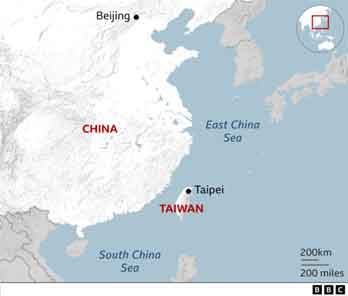
After a relatively brief spell as a Dutch colony, Taiwan was administered by China’s Qing dynasty, before it was ceded to Tokyo after Japan won the First Sino-Japanese War.
After World War Two, Japan surrendered and relinquished control of territory it had taken from China. Afterwards, Taiwan was officially considered occupied by the Republic of China (ROC), which began ruling with the consent of its allies, the US and UK.
But in the next few years a civil war broke out in China, and then-leader Chiang Kai-shek’s troops were defeated by Mao Zedong’s Communist army.
Chiang, the remnants of his Kuomintang (KMT) government and their supporters – about 1.5m people – fled to Taiwan in 1949. Chiang established a dictatorship, backed by USA, that ruled Taiwan until the 1980s. Following his death, his son took over and Taiwan began a transition to democracy and held its first elections in 1996.
So who recognises Taiwan?
There is disagreement about the status of Taiwan. Chiang’s ROC government-in-exile at first claimed to represent the whole of China, which it intended to re-occupy. It held China’s seat on the United Nations Security Council and was recognised by many Western nations as the only Chinese government.
But by the 1970s some countries began to argue that the Taipei government, operating from a group of islands with a small population, could no longer be considered a genuine representative of the people living in mainland China, with 140 crore population.
In 1971, the UN switched diplomatic recognition to Beijing. Once China began opening up its economy in 1978, the US recognised opportunities for trade and the need to develop relations. It formally established diplomatic ties with Beijing in 1979.
Since then the number of countries that recognise the ROC government has fallen drastically with only 12 countries recognising the island today.
*** ***
Ramakrishnan is a political observer who contributed articles to countercurrents.org, a distinguished magazine committed to the cause of opposing imperialism and supporting world peace, including a series on China and India-China relations, like …
Disinformation, a key instrument of India’s foreign policy in relation to China and Pakistan?
India-China War, 1962: Recalling the story of the historic, unilateral ceasefire… in search of peace and development
Xi Jinping’s visit to Vietnam marks a new milestone in countering American hegemonist expansion, an Asian Nato, hopefully paving the way to peace (Dec 24, 2023)


